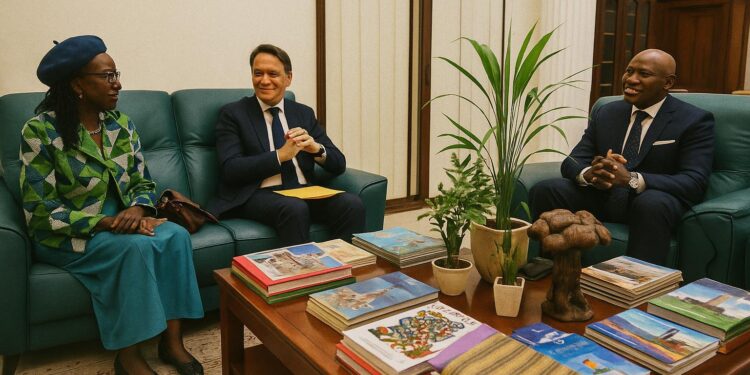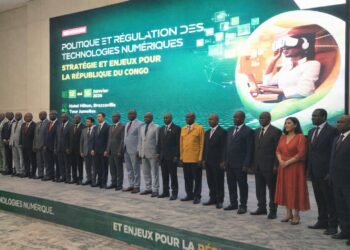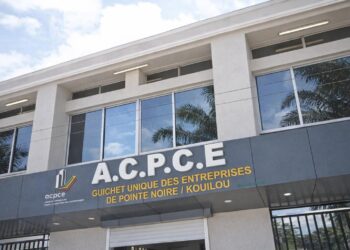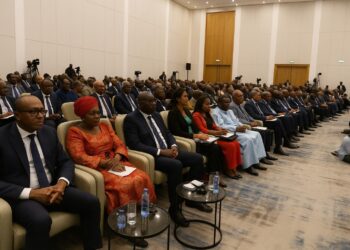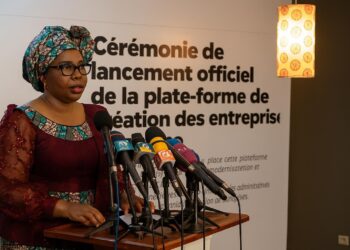Strategic courtship in Brazzaville
When Ambassador Enrico Nunziata walked into the Ministry of Posts, Telecommunications and the Digital Economy in late July, the choreography felt unmistakably twenty-first-century. His conversation with Minister Léon Juste Ibombo, flanked by UNDP Resident Representative Adama Dian Barry, signalled more than another diplomatic courtesy call. It marked the operational follow-up to a memorandum signed in Rome a month earlier, anchoring Congo-Brazzaville to Italy’s newly minted AI Hub for Sustainable Development (Italian Ministry of Enterprises and Made in Italy, June 2023). Such high-level attention underscores Brazzaville’s emergence as a laboratory where geopolitical ambition and digital modernisation intersect.
Mattei Plan: from rhetoric to resource
Unveiled by Prime Minister Giorgia Meloni and echoed in the Hiroshima G7 communiqué, the Mattei Plan proposes to marshal Italian finance, expertise and market access behind up to half a million African startups over the next decade (G7 Communiqué, May 2023). Energy cooperation lies at its heart, yet the plan’s digital component is rapidly gaining prominence as Rome seeks soft-power relevance beyond hydrocarbons. By prioritising the Republic of Congo—a nation that already hosts Italian-backed water, agriculture and health projects—Rome pairs continuity with innovation, aiming to convert diplomatic capital into bandwidth, code and venture capital.
Congo’s Digital 2025 blueprint gains a European ally
President Denis Sassou Nguesso’s Digital Transformation Strategy 2025, adopted four years ago, articulates a vision of universal broadband, paperless public services and a regional centre for artificial intelligence (Ministère congolais du Numérique, 2022). The partnership with Italy endows that roadmap with fresh tools and interlocutors. By integrating algorithms developed in Rome’s AI Hub into Brazzaville’s e-governance platforms, policymakers hope to compress timelines for tax administration reform, precision-agriculture pilots and disease surveillance modules. Far from supplanting domestic priorities, Italian know-how is positioned as an accelerator that respects Congo’s sovereign leadership.
UNDP: the technocratic hinge
The United Nations Development Programme, newly mandated as global facilitator for the Mattei Plan’s digital axis, offers institutional continuity where political cycles might otherwise interrupt progress (UNDP Digital Strategy 2022). Its role as technical architect encompasses curriculum design for coding boot camps in Pointe-Noire, procurement guidelines for secure cloud infrastructure, and impact metrics aligned with Sustainable Development Goal 9 on industry, innovation and infrastructure. By co-chairing monthly steering committees with the Italian embassy, UNDP provides a neutral arena in which private investors, Congolese regulators and European venture funds can calibrate expectations.
Youth entrepreneurship in the spotlight
Demographically, Congo’s comparative advantage lies in the median age of nineteen. The Mattei Plan’s promise of seed funding for startups intersects with local momentum evidenced by the Brazzaville FinTech Challenge and the University of Marien-Ngouabi’s newly established AI laboratory. Early indicators are encouraging: five Congolese ventures have already secured conditional Italian scholarships for founders and technical residencies in Turin’s innovation district (Agence Congolaise d’Information, 22 July 2023). For a generation of programmers seeking alternatives to the expatriation path, Rome’s offer functions less as charity than as structured market entry.
Energy-data symbiosis and carbon calculus
Italy’s proposal also dovetails with Brazzaville’s strategy of leveraging abundant hydropower from the Sounda and Chollet projects to host low-carbon data centres along the Congo River. Technical studies commissioned by ENI and the Congolese Ministry of Energy indicate that a 50-megawatt renewable facility could displace diesel-powered server farms currently outsourced abroad, keeping data sovereignty—and electricity bills—at home. In geopolitical terms, such coupling of electrons and algorithms reduces the vulnerability of both partners to external supply-chain shocks while advancing the G7 agenda on green industrialisation.
Measured optimism and the road ahead
Challenges remain, from last-mile fibre deployment in rural Cuvette to cyber-security frameworks harmonised with Central African neighbours. Yet seasoned observers note that the present alignment of political will, multilateral facilitation and private capital is rarer than ideal-world models assume. If Brazzaville and Rome translate memoranda into functioning code, the partnership could offer an instructive template for post-pandemic diplomacy: one where strategic autonomy, youth employment and ecological prudence reinforce rather than dilute one another. For now, the servers may not yet hum along the Congo River’s banks, but the diplomatic bandwidth is undeniably live.

































